 Anime is a threat to American values. It injects foreign ideas into the veins of American culture, particularly American masculinity.
Anime is a threat to American values. It injects foreign ideas into the veins of American culture, particularly American masculinity.
But then, American masculinity needs the medicine.
Click-bait title and introduction aside, let’s look at American values. The United States contains several core values: freedom of speech, rights of the individual, equality, achievement, social mobility, and competition (Doran, 2013). American masculinity revolves around individualism, competition, achievement, and sexual prowess. The core value of masculinity is quantity. More achievement, material, power, sex, and masculinity itself. American men raised on the idea that maleness is something we accumulate through action. It is something to be saved, like money. Like money, maleness can be lost. Guys who don’t try to climb to corporate ladder are not as manly as those who do (Tuck, 2003). This idea of American masculinity reaches back to Greek and Roman culture. Semen became the symbol for this idea. It made man masculine in the ancient West. Today, we substitute achievement for semen, but the links between achievement and man milk can be seen in the writings of the second-century physician Aretaeus the Cappadocian (Tuck, 2013):
[I]t is the semen when possessed of vitality which makes us to be men, hot well braced in limbs, hairy, well boiced, spirited, strong to think and act.
It is thought semen could also distract a man.In There’s Something About Mary, Ted (Ben Stiller) is told to masturbate before his date with Mary (Cameron Diaz) so he doesn’t have “baby batter on the brain”. The movie shows the American focus on sex. The scene reflects how men can’t speak with women without thinking about sex unless he takes himself in hand first. Sexual prowess underpins American masculinity. You see it in the way products are marketed to men. They are all designed in one way or another to enhance male performance. Even car commercials equate their design and performance with this currency view of maleness. A male isn’t something you are. It is something you earn and buy. In my area, many people consider stay-at-home fathers as strange and effeminate because they aren’t out earning bread like a man.
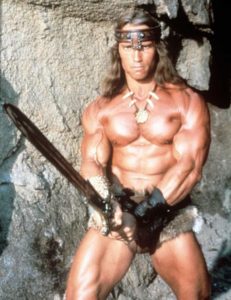
American masculinity contains only one side. Gay men, for example, are portrayed as feminine. As if femininity is somehow wrong. One of the worst insults a straight man can endure is being called gay. It essentially calls him a woman. While this is insulting to gay men and women, the insult ties back to the values of maleness: sexual prowess, achievement, authority. So-called real men must be on top, sexually and socially. That is one reason why many parts of American culture find homosexuality abhorrent: gay men aren’t acting like “men”. Likewise, stay-at-home fathers fail to act as “men”.
These ideas extend toward male anime fans. Male anime fans who enjoy romantic comedies trouble those who think with chest hair. After all, American anime fans live inside American culture. Yet, male anime fans have access to a different perspective. Some anime offer a different view of masculinity as we shall see.
Anime’s Softer Side of Manhood
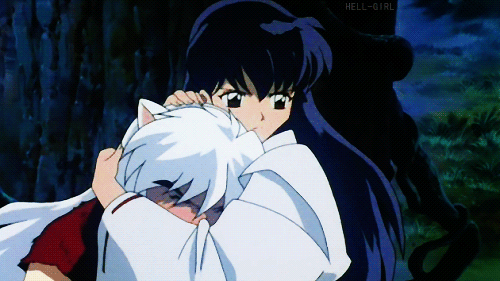 American romantic comedies target women. Sex comedies try to appeal to men. These comedies, unlike romantic comedies targeting women, don’t focus on emotions and wishes (Newitz, 1995). Sex comedies fall in line with the American view of manhood. Anime, however, suggest American masculinity isn’t the only type of masculinity. Okay, yes, anime has many shows that play right into typical views of masculinity — the man dominating various girls. In fact, anime can have a dim view of men. But I will focus on the alternative views here. Anime romances represent a different type of heterosexual masculinity, one based on romantic feelings instead of sexual ability. They also break the equation American romance has: sex = love, love = sex. Newitz (1995) writes:
American romantic comedies target women. Sex comedies try to appeal to men. These comedies, unlike romantic comedies targeting women, don’t focus on emotions and wishes (Newitz, 1995). Sex comedies fall in line with the American view of manhood. Anime, however, suggest American masculinity isn’t the only type of masculinity. Okay, yes, anime has many shows that play right into typical views of masculinity — the man dominating various girls. In fact, anime can have a dim view of men. But I will focus on the alternative views here. Anime romances represent a different type of heterosexual masculinity, one based on romantic feelings instead of sexual ability. They also break the equation American romance has: sex = love, love = sex. Newitz (1995) writes:
Anime offer to the post-sexual revolution generation stories which suggest that young men and women do not need to have sex in order to experience love.
Anime romances provide a way for American guys to enjoy a romance where the male character wants to fall in love rather than want to have sex. The passive nature of these male characters run against the masculine ideals of being a dominating, go-get-em leader. The male characters explore a tender side of manhood. They are free to experience love and emotions normally considered feminine. Look at Love, Chunibyo, and other Delusions.
The story centers on the growing emotional connection between Yuta and Rikka. Over the course of the anime, Yuta backs Rikka away from sex and other physical shows of love on several occasions. He wants to develop a deep emotional bond with her. If the story was American, he would have taken her to the sack instead of telling her not to worry about such things. These types of romantic comedies move manhood away from what is between the legs and toward the nobility of love and empathy. These stories often have a character who represents typical masculinity, a character that gawks at the ladies and is otherwise focused on sex. These characters serve as a backdrop to show how much better a male focus on emotion can be. They also fail to understand the main male’s focus on love. It speaks to how many men feel about society. Only a few express their disdain for the male focus on sex.
Waifu and Love
Waifuism came from needs of men to experience love outside of the sexual dimension. Condry (2012) quotes:
For people who have grown up with the “common sense” that love equals the 3-D World, it may be impossible to convey the point I’d like to make: 3-D love is like the Edo era’s shogunate government. Throughout that period, everyone thought that the shogunate would continue forever. It was almost impossible to imagine another kind of government, and floating in this vague understanding, all of a sudden, the black ships appeared…Now, the love revolution expanding in Japan is easiest to understand in terms of Meiji Restoration. For a long time, everyone expected the commonsense belief that “love = 3-D world” would continue, but it has begun to be destroyed by the appearance of the moe phenomena.
Waifuism comes from a dissatisfaction with the cultural norms of male love. A guy can’t have sex with his waifu, ignoring body pillows and other things that some people indulge. This allows him to experience love outside of social sexual expectations.
Sex is Fine, Just Not as a Core Value
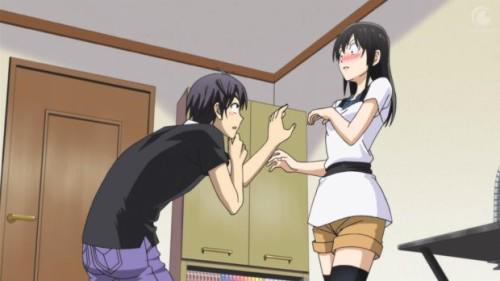 Sex isn’t the issue with any of this. The focus of American culture on sex and accumulation as the defining characteristics of masculinity damages men. Anime’s message that it is okay to be a guy and want to experience romantic love undermines American culture. It shows how it is okay to be a heterosexual guy and not focus on getting between a girl’s legs. In fact, many of these anime stories reveal how seeking emotional connections over physical is superior.
Sex isn’t the issue with any of this. The focus of American culture on sex and accumulation as the defining characteristics of masculinity damages men. Anime’s message that it is okay to be a guy and want to experience romantic love undermines American culture. It shows how it is okay to be a heterosexual guy and not focus on getting between a girl’s legs. In fact, many of these anime stories reveal how seeking emotional connections over physical is superior.
Some anime seek to reinforce traditionally dominate male roles. And anime still has problems with objectifying women. However, anime is one of the few mediums that provide an alternative to American macho values. This doesn’t stop men from being the target of insults and bullying. Male anime fans that enjoy romantic comedies have the same problems as men who enjoy Hollywood romantic comedies.
American masculinity has come under threat by women and the increasing acceptance of homosexuality. These threats make those who hold these traditional values louder and more insistent. However, many men who grew up watching anime live in ways that reveal a softer, stronger side of being male. And these men are raising sons of their own. With time perhaps the one-sided view of manhood will fade.
The Focus on Community and Cooperation
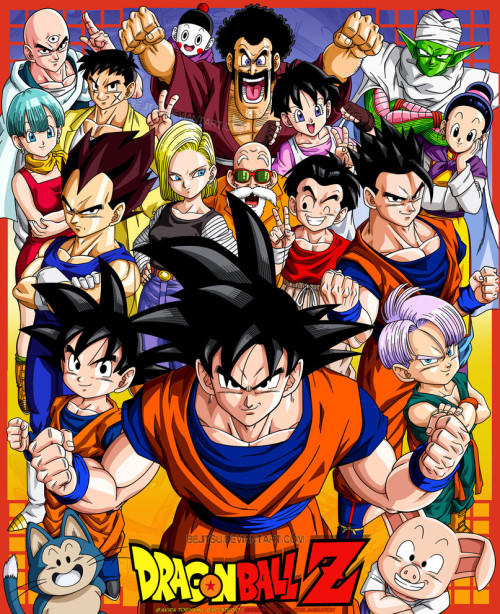 Aside from the focus on sexual prowess, anime also undermines the American ideas of individualism and competition. Many parents raise American men to compete. Competition and individualism are kissing cousins. When you view yourself as a self-made product, you will naturally feel drawn toward looking out for oneself first. The US teaches competition (and the greed that results from it) is good. We have the mistaken idea that competition makes people more productive and achieve more. Of course, we measure achievement in terms money and other possessions. Even in team situations, competition rather than cooperation takes focus. People jockey for position or to stand out from their peers, and companies reward such behavior.
Aside from the focus on sexual prowess, anime also undermines the American ideas of individualism and competition. Many parents raise American men to compete. Competition and individualism are kissing cousins. When you view yourself as a self-made product, you will naturally feel drawn toward looking out for oneself first. The US teaches competition (and the greed that results from it) is good. We have the mistaken idea that competition makes people more productive and achieve more. Of course, we measure achievement in terms money and other possessions. Even in team situations, competition rather than cooperation takes focus. People jockey for position or to stand out from their peers, and companies reward such behavior.
American manhood focuses on competition: having more money, having a bigger home, having a hotter wife, having more loyalty to a sports team. Then you have anime. Most anime focuses on cooperation and community. Every great hero has a posse of friends who helps him achieve. Competition in anime centers on improvement for both people — the drive to get stronger. I wrote more about idea of support and mutual improvement in my Goku Versus Superman article. Anime undermines this aspect of American culture by showing how no one is truly self-made. Each person has a support system. Even if sometimes they are unaware of that support system. For example, public services like police, fire protection, roads, air quality, water quality, and other infrastructure form support systems so-called self-made business people don’t consider in their views. In a similar way, anime heroes have invisible and visible support systems. Anime heroes measure their manhood by how well they return value to those support systems.
Dragonball Z‘s Goku is a good representation of manhood. Goku can’t achieve any of his victories without the help of his friends. He is also a father who isn’t afraid to express his love for his son.
Anime provides a welcome alternative to traditional American masculinity. Granted, not all anime offers this alternative view. We internalize value systems without realizing it. Anime and other media allow us to see a different perspective, and that perspective can reveal the unhealthy aspects of our value systems. American men often live one-dimensional lives. We fail to get in touch with our “feminine side”. Even calling these male emotions feminine seeks to denigrate both. It is good not to focus on sex in a relationship. It is good to want to love someone and embrace those emotions. It is good to stand against competition and individualism. If enough men stand up for the other side of manhood, we may be able to achieve a better balance. If women refuse to associate with men who are driven by sex and competition, perhaps some of these men may discover the side they are missing.
Or maybe we should just require everyone to watch anime that foster a more caring yet still macho view of manhood. That just might work too.
References
Condry, I (2012). Love Revolution. Recreating Japanese Men. University of California Press. 262-283.
Doran, C., & Romie Littrell (2013) Measuring Mainstream US Cultural Values. J Bus Ethics. 117. 261-280.
Newitz, A. (1995) Magical Girls and Atomic Bomb Sperm: Japanese Animation in America. Film Quarterly. 49 (1). 2-15.
Tuck, G. (2003). Mainstreaming the Money Shot: Reflections on the Representation of Ejaculation in Contemporary American Cinema. Paragraph, 26(1/2), 263.

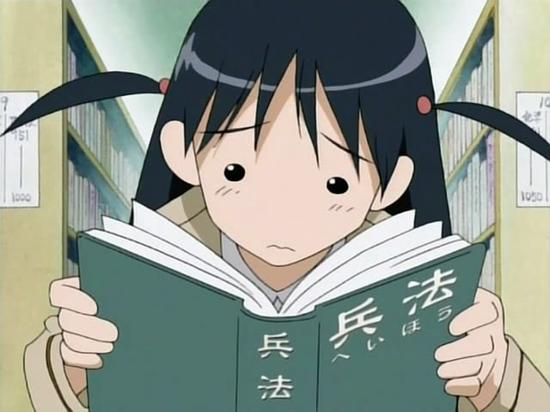
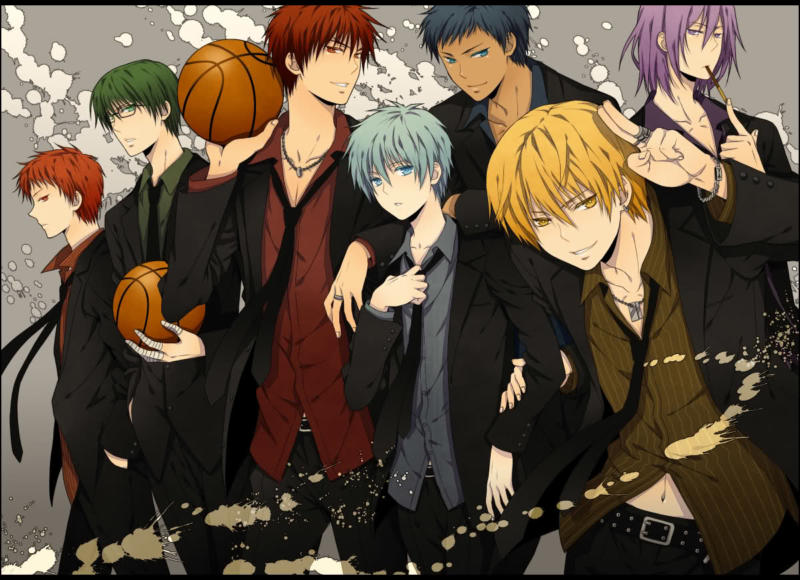
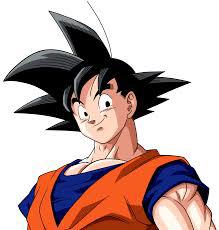
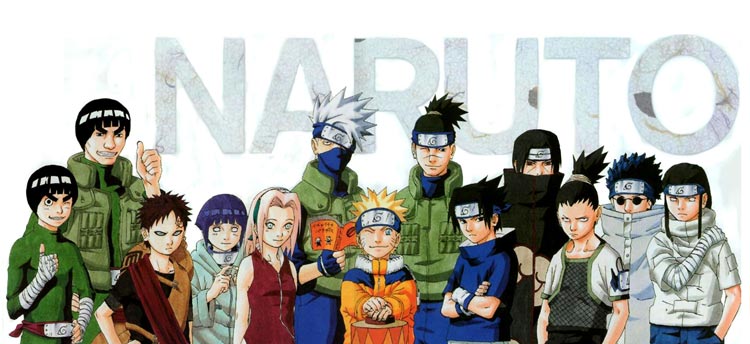

Shots fired! But in a good way!
I’ve often wondered how much anime has affected me. I suppose it’s made me a hopeless romantic over the years. At the same time, I’ve seen hentai and that kind of makes me go “Oooo sex.”
The article also makes me think about the growing number of American men that are committing suicide since “American values” are one reason for such.
American masculinity, as it is now, isn’t healthy. It creates a one-sided view that, ironically, undermines the ability of men to attain the values it encourages.
Suicide rates have skyrocketed among white men in the United States in recent years. I agree with you, “American values” are one contributing factor.